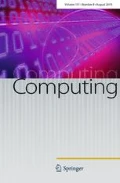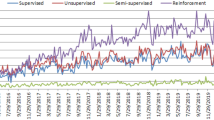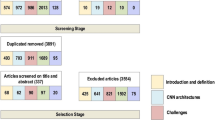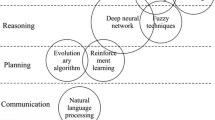Abstract
The service composition problem in Cloud computing is formulated as a multiple criteria decision-making problem. Due to the extensive search space, Cloud service composition is addressed as an NP-hard problem. In addition, it is a long term based and economically driven. Building an accurate economic model for service composition has great attention to interest and importance for the Cloud consumer. A deep learning based service composition (DLSC) framework has been proposed in this paper. The proposed DLSC framework is considered an amalgamation between the deep learning long short term memory (LSTM) network and particle swarm optimization (PSO) algorithm. The LSTM network is applied to accurately predict the Cloud QoS provisioned values, and the output of LSTM network is fed to PSO algorithm to compose the best Cloud providers to contract with them for composing the needed services to minimize the consumer cost function. The proposed DLSC framework has been implemented using a real QoS dataset. According to the comparative results, it is found that the performance of the proposed framework outperforms the existing models with respect to the predictive accuracy and composition accuracy.













Similar content being viewed by others
Notes
https://github.com/SamarShabanCS/Math_for_ML/tree/master/time series data QoS.
References
Motahari-Nezhad HR, Stephenson B, Singhal S (2009) Outsourcing business to cloud computing services: opportunities and challenges. IEEE Internet Comput 10:1–17
Yu Q, Liu X, Bouguettaya A, Medjahed B (2008) Deploying and managing web services: issues, solutions, and directions. VLDB J 17:537–572
Bittman TJ (2019) Hybrid clouds and hybrid IT: the next frontier. In: Gart. Inc. https://www.gartner.com/event/local-briefing/2544619. Accessed 1 Apr 2019
Candan KS, Li W-S, Phan T, Zhou M (2011) At the frontiers of information and software as services. In: Agrawal D, Candan KS, Li WS (eds) New frontiers in information and software as services. Springer, Berlin, pp 283–300
Sun L, Dong H, Hussain FK et al (2014) Cloud service selection: state-of-the-art and future research directions. J Netw Comput Appl 45:134–150
Zeng L, Benatallah B, Ngu AHH et al (2004) QoS-aware middleware for web services composition. IEEE Trans Softw Eng 30:311–327
Jaeger MC, Muhl G, Golze S (2005) QoS-aware composition of web services: a look at selection algorithms. In: IEEE international conference on web services (ICWS’05), IEEE
Canfora G, Di Penta M, Esposito R, Villani ML (2005) An approach for QoS-aware service composition based on genetic algorithms. In: Proceedings of the 7th annual conference on genetic and evolutionary computation, ACM, pp 1069–1075
Lewis PR, Faniyi F, Bahsoon R, Yao X (2013) Markets and clouds: adaptive and resilient computational resource allocation inspired by economics. In: Suri N, Cabri G (eds) Adaptive, dynamic, and resilient systems. CRC Press, Boca Raton, pp 285–318
Natis YV (2012) Gartner aPaaS report card: choose your cloud application platform wisely
Ye Z, Bouguettaya A, Zhou X (2012) QoS-aware cloud service composition based on economic models. In: International conference on service-oriented computing, Springer, pp 111–126
Haytamy SS, Kholidy HA, Omara FA (2018) ICSD: integrated cloud services dataset. In: Yang A et al (eds) Lecture notes in computer science (including subseries lecture notes in artificial intelligence and lecture notes in bioinformatics). Springer, Cham
Ye Z, Mistry S, Bouguettaya A, Dong H (2016) Long-term QoS-aware cloud service composition using multivariate time series analysis. IEEE Trans Serv Comput 9:382–393
Zheng Z, Wu X, Zhang Y et al (2013) QoS ranking prediction for cloud services. IEEE Trans Parallel Distrib Syst 24:1213–1222
Pacheco-Sanchez S, Casale G, Scotney B et al (2011) Markovian workload characterization for QoS prediction in the cloud. In: 2011 IEEE 4th international conference on cloud computing, IEEE, pp 147–154
Zhang Y, Zheng Z, Lyu MR (2011) WSPred: a time-aware personalized QoS prediction framework for web services. In: 2011 IEEE 22nd international symposium on software reliability engineering, IEEE, pp 210–219
Zheng Z, Ma H, Lyu MR, King I (2013) Collaborative web service QoS prediction via neighborhood integrated matrix factorization. IEEE Trans Serv Comput 6:289–299
Li L, Rong M, Zhang G (2011) A web service QoS prediction approach based on multi-dimension QoS. In: 2011 6th international conference on computer science & education (ICCSE), IEEE, pp 1319–1322
Zhang M, Liu X, Zhang R, Sun H (2012) A web service recommendation approach based on QoS prediction using fuzzy clustering. In: 2012 IEEE ninth international conference on services computing, IEEE, pp 138–145
Ye Z, Bouguettaya A, Zhou X (2013) QoS-aware cloud service composition using time series. In: international conference on service-oriented computing, Springer, pp 9–22
Papazoglou MP, Traverso P, Dustdar S, Leymann F (2007) Service-oriented computing: state of the art and research challenges. Computer (Long Beach Calif) 40:38–45
Liang Q, Wu X, Lau HC (2009) Optimizing service systems based on application-level QoS. IEEE Trans Serv Comput 2:108–121
Hayyolalam V, Kazem AAP (2018) A systematic literature review on QoS-aware service composition and selection in cloud environment. J Netw Comput Appl 110:52–74
Wu B, Chi C-H, Chen Z et al (2009) Workflow-based resource allocation to optimize overall performance of composite services. Futur Gener Comput Syst 25:199–212
Qu L, Wang Y, Orgun MA (2013) Cloud service selection based on the aggregation of user feedback and quantitative performance assessment. In: 2013 IEEE international conference on services computing, IEEE, pp 152–159
Baumol WJ, Blinder AS (2011) Economics—principles and policy (paperback), 12th edn. South-Western College Publishing, Mason
D’Agostino D, Galizia A, Clematis A et al (2013) A QoS-aware broker for hybrid clouds. Computing 95:89–109
Benouaret K, Benouaret I, Barhamgi M, Benslimane D (2018) Efficient top-k cloud services query processing using trust and QoS. In: International conference on database and expert systems applications, Springer, pp 203–217
Amdouni S, Barhamgi M, Benslimane D et al (2014) Web services composition in the presence of uncertainty. In: International conference on conceptual modeling, Springer, pp 136–143
Berkelaar M, Eikland K, Notebaert P (2004) LPSolve: open source (mixed-integer) linear programming system, version 5.0. 0.0. http://tech.groups.yahoo.com/group/lp_solve. Accessed May 2004
Ye Z, Zhou X, Bouguettaya A (2011) Genetic algorithm based QoS-aware service compositions in cloud computing. In: International conference on database systems for advanced applications, Springer, pp 321–334
Zhu J, He P, Zheng Z, Lyu MR (2014) Towards online, accurate, and scalable QoS prediction for runtime service adaptation. In: 2014 IEEE 34th international conference on distributed computing systems, IEEE, pp 318–327
Liu S, Wei Y, Tang K et al (2015) QoS-aware long-term based service composition in cloud computing. In: 2015 IEEE congress on evolutionary computation (CEC), IEEE, pp 3362–3369
Mistry S, Bouguettaya A, Dong H, Qin AK (2015) Predicting dynamic requests behavior in long-term IaaS service composition. In: 2015 IEEE international conference on web services, IEEE, pp 49–56
Mistry S, Bouguettaya A, Dong H, Erradi A (2016) Qualitative economic model for long-term IaaS composition. In: International conference on service-oriented computing, Springer, pp 317–332
Mistry S, Bouguettaya A, Dong H, Qin AK (2018) Metaheuristic optimization for long-term IaaS service composition. IEEE Trans Serv Comput 11:131–143
Labbaci H, Medjahed B, Aklouf Y (2017) A deep learning approach for long term QoS-compliant service composition. In: International conference on service-oriented computing, Springer, pp 287–294
Popoola A, Ahmad K (2006) Testing the suitability of wavelet preprocessing for TSK fuzzy models. In: 2006 IEEE international conference on fuzzy systems, IEEE, pp 1305–1309
Ramsey JB (1999) The contribution of wavelets to the analysis of economic and financial data. Philos Trans R Soc Lond Ser A Math Phys Eng Sci 357:2593–2606
Colah’s blog (2019) http://colah.github.io/posts/2015-08-Understanding-LSTMs/. Accessed 4 Mar 2019
Del Valle Y, Venayagamoorthy GK, Mohagheghi S et al (2008) Particle swarm optimization: basic concepts, variants and applications in power systems. IEEE Trans Evol Comput 12:171–195
Synthetic dataset (2019) https://github.com/TimeSynth/TimeSynth. Accessed 15 May 2019
Jiang W, Lee D, Hu S (2012) Large-scale longitudinal analysis of soap-based and restful web services. In: 2012 IEEE 19th international conference on web services, IEEE, pp 218–225
Manning C, Raghavan P, Schütze H (2010) Introduction to information retrieval. Nat Lang Eng 16:100–103
Ye Z, Bouguettaya A, Zhou X (2014) Economic model-driven cloud service composition. ACM Trans Internet Technol 14:20
Nourani V, Komasi M, Mano A (2009) A multivariate ANN-wavelet approach for rainfall–runoff modeling. Water Resour Manag 23:2877
Kim TY, Oh KJ, Kim C, Do JD (2004) Artificial neural networks for non-stationary time series. Neurocomputing 61:439–447
Author information
Authors and Affiliations
Corresponding author
Additional information
Publisher's Note
Springer Nature remains neutral with regard to jurisdictional claims in published maps and institutional affiliations.
Rights and permissions
About this article
Cite this article
Haytamy, S., Omara, F. A deep learning based framework for optimizing cloud consumer QoS-based service composition. Computing 102, 1117–1137 (2020). https://doi.org/10.1007/s00607-019-00784-7
Received:
Accepted:
Published:
Issue Date:
DOI: https://doi.org/10.1007/s00607-019-00784-7




